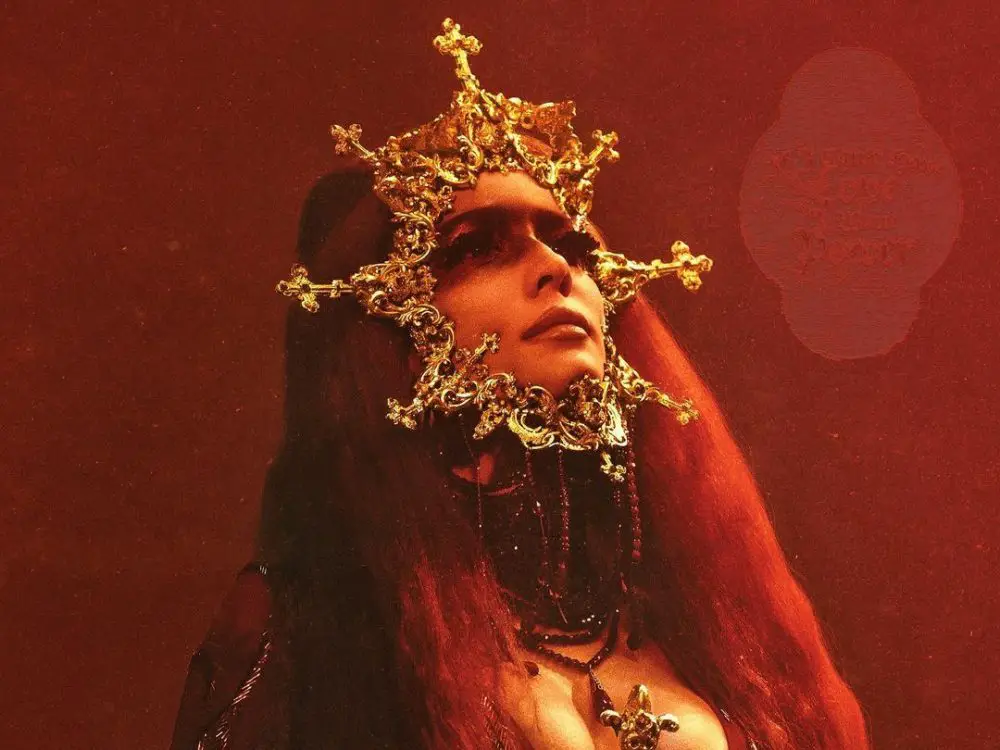“Oh, the loneliest girl in town is bought for pennies a price,” laments the first lines of Halsey’s haunting album opener, “The Tradition.” On the track, Halsey, who uses she/they pronouns, introduces listeners to the tradition: a way of life ingrained in blood that survives off the exploitation and mistreatment of women. People “take what [they] want,” never asking for permission. It’s a grim message, and one that allows Halsey to set the tone for the rest of their fourth album, “If I Can’t Have Love, I Want Power.”
A Career of Concepts
Halsey, born Ashley Nicolette Frangipane, has always shown an affinity for concept albums. Her first project, “Badlands,” was framed around a dystopian society called The Badlands. Halsey used the synth-pop dreamscape of this fictional location to serve as a metaphor for her mental state at the time.
“Hopeless Fountain Kingdom,” Halsey’s sophomore endeavor, adopted even more expansive world-building. There, a modern-day Romeo and Juliet love story took place. Hopeless Fountain Kingdom serves as a purgatory for those who are too bad for heaven and too good for hell. The Aureum and Angelis families’ feud comes to a head when star-crossed lovers Luna and Solis enter the stage.
Though their third album, “Manic,” stepped away from the cohesive sounds and storylines of their previous projects, it still proposes a concept all its own. The album is described as being “by Ashley for Halsey.” It represents Ashley’s first time addressing the audience as themselves. Though the album is less cohesive, this is by design; it’s meant to recreate their experience with bipolar disorder.
Then comes “If I Can’t Have Love, I Want Power.” Halsey explained on Instagram, “This album is a concept album about the joys and horrors of pregnancy and childbirth.” The artwork mimics Jean Fouquet’s “The Virgin and Child with Angels.” Halsey is depicted holding a child on a golden throne, her left breast exposed and an ornate crown atop her head.
Regarding the cover art, Halsey wrote, “The dichotomy of the Madonna and the Whore. The idea that me as a sexual being and my body as a vessel and gift to my child are two concepts that can co-exist peacefully and powerfully.” These dichotomies and double binds are the basis of the album.
Halsey Reclaims Their Power
If the title is any indication, “If I Can’t Have Love, I Want Power” is about reclaiming something that has been taken away. The prophetic “The Tradition” and its allusion to the exploitation of women in the music industry fades to tracks like “Bells in Santa Fe,” a spectral reminder of the transience of career, personhood and even life itself.
The album is consistently feminist. As Halsey explained in her announcement post, “My body has belonged to the world in many different ways the past few years, and this image is my means of reclaiming my autonomy and establishing my pride and strength as a life force for my human being.”
In “Lilith,” Halsey addresses the sexist predispositions about women as mean or hostile: “You got me thinkin’ that I was too mean, well, everything that I say, I believe.” In “You Asked For This,” they attempt to convince themselves that they asked for whatever situation they’ve found themselves in, as if saying “go on and be a big girl” could make it true. In reality, Halsey and many other women like her were forced to grow up too young.
Mortality is also a recurring theme. On “Ya’aburnee,” Halsey sings to their newborn child Ender Ridley Aydin and their partner Alev Aydin. “Darling, you will bury me before I bury you.” Here, they express a love so pure and consuming that they can’t imagine living without these people in the world.
Seemingly in contradiction, Halsey claims on “1121” that she won’t “die for love.” Or perhaps it’s not a contradiction at all, but rather a sign that she has finally found the right kind of love — the kind of love that is worth dying for. “1121” just wasn’t it.
Above all, Halsey embraces dichotomy. On “I am not a woman, I’m a god,” they call themselves a martyr, a problem, a legend and a fraud in quick succession. Throughout the entire album, they explore the pockets and caves of self-destruction in their life and endeavor to escape them. But what happens when that self-destruction is a part of who they are? As my favorite song, “Whispers,” reminds listeners, “You sabotage the things you love the most. Camouflage so you can feed the lie that you’re composed.”
Destruction and control, bodily horror and bodily autonomy — these entities balance on a tightrope. Halsey is simultaneously all of them, some of them and none of them. She accomplishes this strange, inconsistent sentiment by diving headfirst into its broken parts. She’s finally accepting what she’s been denied and claiming what she wants, but even that can be a terrifying prospect.
A Culmination of Successes
“If I Can’t Have Love, I Want Power” debuted in August and was accompanied by a limited IMAX release of a 50-minute visual album experience. The film sold out in over 70 locations and grossed $735,000. The album itself has been met with praise from critics, fans and the likes of Halsey’s friend Taylor Swift, who tweeted praise for their “artistry and commitment to taking risks.”
Part of the album’s sound is owed to its high-profile producers: Trent Reznor and Atticus Ross, core members of industrial rock band Nine Inch Nails. As Halsey explained, Reznor decided to make “weird choices” with the production in order to make people listen and pay attention to what they are saying. This contrasts with a lot of pop music that he argues currently favors comfortability over message.
The album is indeed experimental. While “Manic” played with genre boundaries by leaning into the realms of country and alternative with an Alanis Morissette feature, “If I Can’t Have Love, I Want Power” defies labels altogether. Rock, pop, grunge, electronic, folktales, mysticism, distorted vocals and frenzied whispers — these are all only pieces of the complex and satisfying puzzle that is Halsey’s fourth project.
Primarily, Halsey’s success can be traced back to their own masterful handling of love and power. The album might thrive through storytelling and melodrama, but those elements only work if the bones underneath are just as strong. Despite their differences, each of Halsey’s projects has one thing in common: They gradually pull back the curtain to reveal more details about the complicated artist behind them. Who knows what their fifth album might have to say.

















